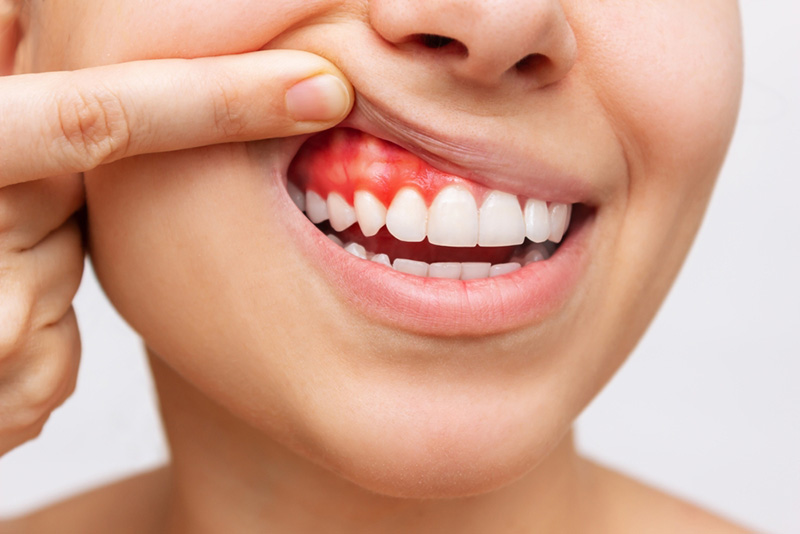
While brushing, flossing, and regular dental check-ups are some of the most important things you can do to maintain good oral health, getting your daily dose of vitamins is just as important for the health of your teeth and gums.
Specific vitamins, such as Vitamins C, D, K, B complex, and calcium, all play an important role in maintaining strong tooth enamel and gums and preventing gum decay and disease. A deficiency in any of these vitamins for healthy teeth puts you at risk of developing dental problems.
These are the 5 best vitamins for teeth and gums.
1. Vitamin C
Vitamin C and oral health go hand in hand. It is not only good for your teeth, but it helps keep your gums healthy, too. As one of the best vitamins for healthy gums and teeth, this antioxidant helps hold your teeth in place and keeps your gums strong.
Without enough vitamin C, your gums may be more prone to bleeding and developing gum disease.
To ensure you get enough vitamin C in your diet, incorporate:
- Citrus fruits (oranges, grapefruit, kiwi, lemon)
- Sweet potatoes
- Peppers
- Berries
- Kale
- Broccoli.
Vitamin C supplements can also help protect against gingivitis and keep your teeth strong.
2. Vitamin D
Vitamin D is responsible for keeping your teeth and bones strong. Without enough vitamin D, you risk developing several oral health disorders, like gum disease, gingival inflammation, and cavities. Luckily, it is easy to work vitamin D into your diet.
The best sources of vitamin D are the flesh of fatty fish and fish liver oils, especially in supplement form. However, that is often difficult for children to consume.
Other ways to get vitamin D include:
- Cheese
- Egg yolks
- Canned tuna
- Mushrooms.
3. Vitamin K2
Vitamin K2 helps to keep your bones strong and prevent tooth decay. This vitamin activates osteocalcin protein, which is responsible for bone growth and repair.
It also helps prevent calcium from building up in the arteries, reducing the risk of stroke and heart disease. Vitamin K2 is found in many green leafy vegetables. All of the benefits of vitamin K2 are discussed in Dr. Kami Hoss’s book, “If Your Mouth Could Talk.”
In fact, as much as 90% of the population is deficient in vitamin K2 and vitamin D due to an excess of time spent indoors and many dietary changes since the Industrial Revolution.
Because of this, it’s important to get these vitamins in supplement form or through the use of oral care products. SuperMouth consumables such as toothpastes, mouthwashes, and flosses include both vitamin K2 and vitamin D.
4. Vitamin B Complex
Vitamin B complex is a group of B vitamins that play a role in improving your oral health. It can help prevent irritation on the inside and outside of the mouth, help prevent gum disease, and reduce gum inflammation and inflammation inside the mouth. These B vitamins include:
- B1 – thiamine
- B2 – riboflavin
- B3 – niacin
- B5 – pantothenic acid
- B6 – pyridoxine
- B7 – biotin
- B9 – folic acid
- B12 – cobalamin
Some good sources of vitamin B include:
- Meat
- Fish
- Cheese
- Milk
- Eggs
- Bananas
- Avocados
- Some fortified breakfast cereals.
There are also plenty of vitamin B supplements that you can add to your diet, either as a complex or a specific B vitamin.
5. Calcium
While calcium is known for being good for your bones, it also helps keep your teeth healthy. It is one of the most essential minerals in the body to help maintain strong bones and teeth. Calcium is easy to include in both children’s and adult’s diets, as so many foods contain it.
Some foods that naturally contain calcium include:
- Dairy products (milk, cheese, yogurt)
- Canned salmon
- Figs
- Soybeans
- Flour tortillas
- Orange juice
- Spinach
- Kale
- Broccoli
- Almonds
- Sesame seeds.
You can also incorporate calcium supplements, both carbonate and citrate, into your diet to ensure you are getting enough calcium.
FAQs About Vitamins for Gum Health
What vitamins are good for oral health?
Vitamins C, D, K2, B complex and calcium are all necessary for good oral health. These vitamins each play different roles in keeping your teeth strong, preventing gum disease and tooth decay, and reducing inflammation. In addition, vitamin A and oral health correlate during tooth and enamel development, especially in children.
How can I strengthen my gums and teeth naturally?
To strengthen your gums and teeth naturally, try incorporating some of these foods containing the 5 essential vitamins into your or your child’s daily diet:
- Citrus fruits
- Sweet potatoes
- Peppers
- Kale
- Broccoli
- Blueberries
- Dairy products
- Almonds
- Sesame seeds
- Cabbage
- Egg yolks
- Canned tuna
- Mushrooms
- Orange juice
By incorporating some of these enamel-enhancing foods into your diet, your teeth can become stronger and more resistant to breaks and decay, and you can reduce your risk of developing gum disease. Also, avoid harmful foods, like sugary or acidic foods, stay hydrated, and regularly clean your tongue.
Are there any oral care products fortified with vitamins and minerals?
Yes! Supermouth products are specially formulated with the most important vitamins for gum health and strong teeth. For instance:
- Supermouth toothpaste contains vitamins K2 and D3
- Supermouth mouthwash also contains vitamins K2 and D3
- Even Supermouth floss is fortified with vitamins
What mineral can regrow teeth and gums?
Calcium and phosphorus can help strengthen and rebuild tooth enamel. While calcium is found mainly in dairy products, nuts, seeds, and some vegetables, phosphorus is found in meat, poultry, fish, and eggs.
Final Thoughts
In addition to attending regular dental check-ups and having an excellent oral hygiene routine, incorporating these best vitamins for teeth and gums can positively impact your or your child’s oral health.
Be sure to visit your dentist every six months, brush twice daily, and floss once daily to maintain your oral health.
Check out Dr Kami’s Book: If Your Mouth Could Talk to order your copy today!

